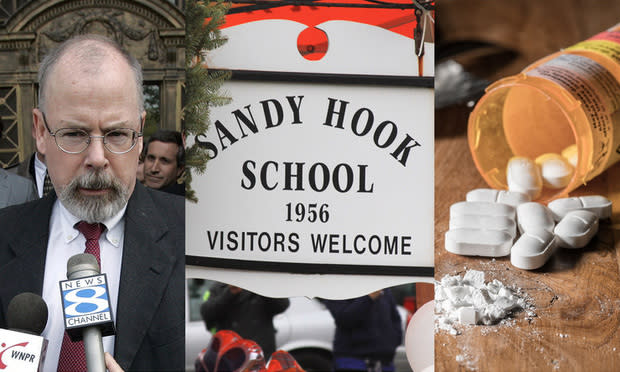2017 in Review: The Biggest Legal Developments in Connecticut
[caption id="attachment_4312" align="aligncenter" width="620"]

John Durham's nomination for U.S. attorney in Connecticut, Sandy Hook liability litigation against gunmakers, and the opioids crisis were among the biggest developments in 2017.[/caption] Destruction of evidence, liability over gun sales, and state limitations on vaccinations were among some of the biggest legal fights in Connecticut courtrooms in 2017. The legal spats tied up Big Law, large companies and Connecticut families. Some of the cases will continue to unfold through 2018. Here's a look at some of the litigation from the past year. Connecticut Municipalities Target Big Pharma Over Opioid CrisisThree of the state's largest cities—New Haven, Waterbury and New Britain—targeted the nation's largest drugmakers, seeking to recoup costs incurred from the opioid crisis. The lawsuits were part of a wave of litigation filed in the wake of the opioid crisis in 2017. New Haven and New Britain are represented by Scott + Scott, while the Waterbury is backed by Simmons Hanly Conroy. Both firms have filed similar municipal lawsuits nationally. The lawsuits are similar in that all three claim there is a long-standing campaign to mislead the public about the dangers of prescription opioids. The lawsuits contend drugmakers have published misleading articles in medical journals encouraging the use of opioids to treat chronic pain. The suits also allege the manufacturers continue to sponsor medical courses that persuade doctors that opioids don't pose a serious threat of addiction. Earlier this month, the U.S. Judicial Panel on Multidistrict Litigation ordered all federal lawsuits brought by cities, counties and states to be transferred to Ohio. Sandy Hook Families, Gunmakers Spar at the Supreme Court The state's high court heard oral arguments on whether families of Sandy Hook school shooting victims can hold gunmakers liable through negligent entrustment. A trial court tossed out the lawsuit against gunmakers Bushmaster and Remington, makers of the AR-15 rifle used to kill 20 students and six educators in December 2012. Thirteen amicus briefs were filed on behalf of 19 entities in what many legal experts believe could be a landmark Second Amendment decision. Among the amicus filings was a brief from the National Rifle Association on behalf of the gunmakers. Paul Clement, C. Harker Rhodes IV and Erin Murphy of Kirkland & Ellis stepped in for the NRA. They were also joined by Kenneth Slater Jr. of Halloran & Sage. Venable Accused of Helping Destroy Evidence In papers filed last month in federal court in Connecticut, Brunswick Rail Management claims Venable—along with Brunswick's former chief executive officer—destroyed evidence in a trade secrets case. The underlying lawsuit claims former CEO and New Canaan resident Paul Ostling relayed confidential information and trade secrets to creditors who could then use the information to hurt Brunswick's bargaining position in a $600 million debt restructuring. Brunswick is a Moscow-based company that leases a fleet of 25,000 railcars to corporate clients in Russia. In court papers, Brunswick claims Ostling and Venable ignored a February preliminary injunction barring destruction of evidence. A contempt of court motion claims Venable "disregarded the PI order and hired an e-discovery vendor to access the Brunswick-owned devices and, in doing so, altered and/or deleted critical forensic evidence of Mr. Ostling's spoliation in the process." Trump Taps John Durham as U.S. Attorney for Connecticut In his eighth wave of nominations, President Donald Trump nominated longtime prosecutor John Durham to be the next U.S. attorney for the District of Connecticut in December. Durham will replace Deirdre Daly if approved by the Senate. Daly, who stepped down in October, was among a handful of President Barack Obama appointees allowed to stay during Trump's transition. A Republican, the 67-year-old Durham previously served as counsel to the U.S. attorney in Connecticut. He had been a Justice Department attorney since 1982. His previous Connecticut posts included working as acting U.S. attorney and deputy U.S. attorney, and he was chief of the Criminal Division. He also previously headed the New Haven field office and the Boston Strike Force on Organized Crime. Durham had also been involved in special investigations under four different attorneys general. Connecticut Supreme Court Curbs State Agency's Power to Vaccinate In a rebuke of the state Department of Children and Families, the Connecticut Supreme Court ruled twice—in August and October—that the agency can't vaccinate a child in state custody without parental approval. In its August 7-0 ruling, the high court agreed with the parents that preventative vaccinations are not "medical treatment" because "treatment" is defined as curing an injury or disease. The high court unanimously reaffirmed its initial ruling two months later when DCF asked for a review because it mistakenly relied on the wrong statute. DCF had originally filed a petition alleging the parents of the two children, both under 10 years old at the time, were neglectful but sought custody. The parents agreed the children should be committed to DCF's care but objected on religious grounds to the vaccinations.

